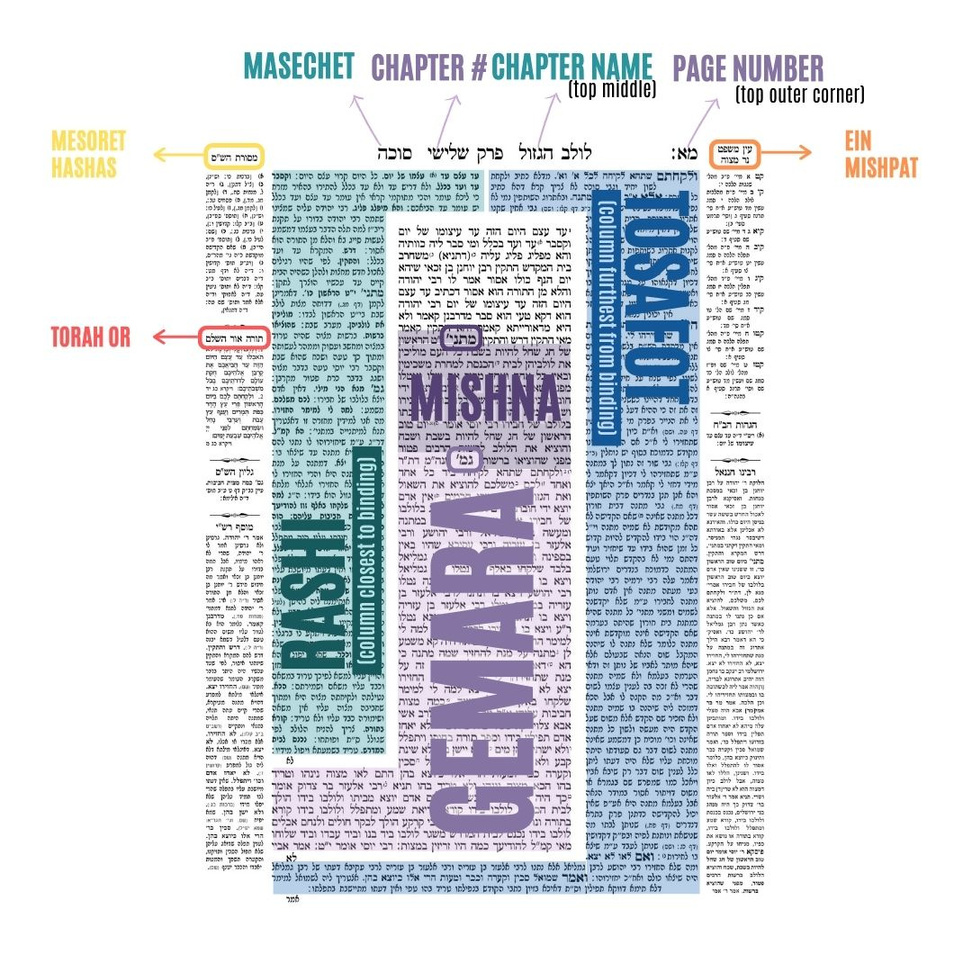Toshba
hadassah
prizont
Sources: sefaria.org
The mesorah is our tradition that is passed down. There are two parts of the mesorah:
תורה שבכתב
The written Torah. It consists of the
תנך: תורה, נביאים, כתובים
תורה שבעל פּה
The oral Torah that was passed down from har Sinai
משנה
Rabbi Yehuda Hanasi collected different parts of the teachings of the תורה שבעל פּה. He then used these to compile the משנה in 250 C.E. The Mishna is divided into:
The books: סדרים
The Subjects: מסכתות
The Sections: פּרקים
The Pages: דפּים
The front or back of pages: עמודים
ש״ס-ששה סדרים
The mishna is divided into 6 books that each cover their own topic:
זרעים- Agriculture
מועד- Special occasions in the jewish calender
נשים- Marriage and Divorce
נזיקין- Damages
קדשים- Korbanot and laws of Kosher
טהרות- Laws of purity and Impurity
גמרא
The Gemara is an explanation of the Mishna.
The Mishna + Gemara is called a תלמוד.
There are 2 Talmudim:
תלמוד בבלי
Written in Babylon in 500 C.E.
We follow this Talmud because its easier to understand, has richer commentary (they incorporated Talmud Yerushalmi since it was made later). Jews were in Babylon so it just became more popular.
תלמוד ירושלמי
Written in 400 C.E. in the north, but still called Yerushalmi because they loved Yerushalayim. It is less clear.
- Wendy Salinas, Rolk Inc
Navigating a Page of Talmud
- The Mishna starts at the words, "מתני".
- The Gemara starts at the words, "גמ".
- Rashi is always close to the binding of the book.
- Tosafot is always far from the binding of the book.

Vocbulary
Breitas are teachings that arent added in the mishna.
A sugya is a discussion of amoraim on the mishna.
ברייתא
סוגיא
Amoraim explained the mishna. They would just speak, but eventually they wrote it down and called it a gemara.
אמורא
Tanaim memorized and learned the conversations of the oral torah to repeat it. Tanaim write in the breitas and the mishna.
תנא
שולחן ערוך and מפה
Written in the 1500's by רב יוסף קארו, the Shulchan Aruch is a book about practical sephardi halachic guidance
שולחן ערוך
רב משה איסרליס created the mapah, which includes all of his ashkenaz comments and additions to the Shulchan Aruch
מפה
SPARQ - דף ט עמוד ב
מַתְנִי׳ מֵאֵימָתַי קוֹרִין אֶת שְׁמַע בְּשַׁחֲרִית? מִשֶּׁיַּכִּיר בֵּין תְּכֵלֶת לְלָבָן. רַבִּי אֱלִיעֶזֶר אוֹמֵר: בֵּין תְּכֵלֶת לְכָרָתֵי. וְגוֹמְרָהּ, עַד הָנֵץ הַחַמָּה, רַבִּי יְהוֹשֻׁעַ אוֹמֵר עַד שָׁלֹשׁ שָׁעוֹת, שֶׁכֵּן דֶּרֶךְ מְלָכִים לַעֲמוֹד בְּשָׁלֹשׁ שָׁעוֹת.
הַקּוֹרֵא מִכָּאן וְאֵילָךְ לֹא הִפְסִיד, כְּאָדָם הַקּוֹרֵא בַּתּוֹרָה.
MISHNA: From when do we say Shema in the morning? when you can tell between blue and white.
Rabbi Eliezer says: between blue and green. And you must finish saying Shema until the end of the time when you rise, for example, sunrise. Rabbi Yehoshua says: until three hours into the day, Because that is when kings rise, after three hours. One who says Shema from here and on loses nothing. Like a man reading from the torah.
Statement
Proof
Answer
Refutation
Question
Flow Chart
מֵאֵימָתַי קוֹרִין אֶת שְׁמַע בְּשַׁחֲרִית?
רַבִּי יְהוֹשֻׁעַ אוֹמֵר עַד שָׁלֹשׁ שָׁעוֹת
רַבִּי אֱלִיעֶזֶר אוֹמֵר: בֵּין תְּכֵלֶת לְכָרָתֵי. וְגוֹמְרָהּ, עַד הָנֵץ הַחַמָּה
מִשֶּׁיַּכִּיר בֵּין תְּכֵלֶת לְלָבָן.
שֶׁכֵּן דֶּרֶךְ מְלָכִים לַעֲמוֹד בְּשָׁלֹשׁ שָׁעוֹת.
הַקּוֹרֵא מִכָּאן וְאֵילָךְ לֹא הִפְסִיד, כְּאָדָם הַקּוֹרֵא בַּתּוֹרָה.
Modern Day Application